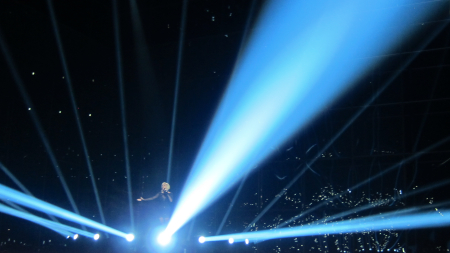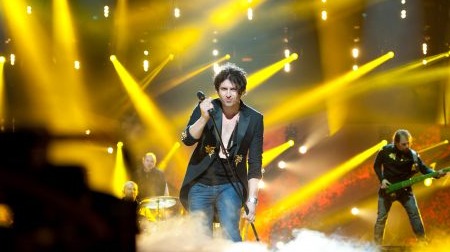Macedonia and Malta have taken steps to hold some of the earliest National Finals in the modern history of selection to the Eurovision Song Contest. For Daniel Kajmakoski and Amber, the next few months will not be spent idly sitting at home waiting for check-in to Vienna to open. They will want to perfect their artistry to squeeze every last point in their quest to reach Saturday night and the Grand Final of the Song Contest.
Ben Robertson looks back on Eurovision transformations and assesses what Macedonia and Malta are likely to do in the run up to May.
A Eurovision Song Is Just For May
Remember, most people do not listen to a Eurovision song before the show on TV in the middle of May. They won’t even (shock horror) know the names of the artists. Which is fair, how many casual Football fans know the names of every player in both squads for the World Cup semi-finals?
The majority of Eurovision fans who are already learning the words to Amber’s ‘Warrior‘ are rare amongst the waves of ordinary folk living amongst them who may casually give a televote in a Eurovision Semi-Final. That one time listen is absolutely vital and that is where (and when) a song needs to shine.
Great performances are one way to make this happen, as is of course a catchy lyric, but underneath a modern pop song lies motifs and structures that we have witnessed countless times before. Macedonia’s entry this year is dominated throughout by a chord sequence of Am C G Dm … one of music’s most common loops. It is new sing but the framework supporting the melody has been tried and tested many times before. Song style and melodic movements have hardly changed through, and the iterative change seems positively stone-age in comparison to the rocket-speed advances in production quality over the last generation.

Sanna Nielsen’s song was predominantly the same four chord loop throughout, but it is the production that made it sparkle
Most easy-to-listen pop music associated with the Eurovision Song Contest will not challenge listeners to new musical conventions. Although songs may have the same shape and structure, one may be more attractive than the other. It is very possible to transform a dirge of a song into something that sounds fabulous.
Putting The Hot Into Hot Mess
Ukraine are past masters at this art. Sadly their grace will not present itself in Vienna as it stands, but their previous two Eurovision entries were selected before the Christmas break and gave NTU plenty of time to implement an overhaul. These songs were re-mastered in readiness for the bigger stage and made a significant improvement during that time. What we witnessed at the national final stage is more a concept idea, a draft plan, than the finished article. The original performance of Gravity had no giant, Tick Tock had no hamster wheel, and while the melody was there the depth of a full orchestration was not. They would not have been top ten entries without it all being knitted together.
Albania is another example of creating a completely new sound after the winning song is announced from Festivali i Këngës each winter. In Albania the gulf in cultures between the traditional competition and the modern day Eurovision Song Contest results in a song that is not fit for purpose after it wins Festivali i Këngës. Some of this is practical, such as recording a new backing track and cutting the length to three minutes, whereas other changes like crazy costumes and language switches are to try and appeal to a market outside of a musically isolated Albania.
With both of these countries there is an expectation for change and continuous improvement in the run up to May. This is in direct opposition to Sweden’s Melodifestivalen, where an act is expected to arrive onto the semi final stage with the final product ready to roll. Sweden can afford to be the last country to select as whatever wins Melodifestivalen can be packaged up the next day ready for the Head of Delegation meeting. Not every country has the technical or commercial muscle that allows Sweden to run a National Final with twenty-eight finalised products.
Money, Money, Money
A notable trend that is consistent amongst the National Finals from the smaller Eurovision nations is that the winning gives you a pot of money. Iceland gives you 1 million Icelandic krona, Malta gives you 7500 Euros and Macedonia’s recent winner received 20,000 Euros .
Prize money is one thing, but the prize of building a successful musical career beyond your own national arena is the bigger goal. This money is designed by the broadcasters not just to encourage entrants, but to encourage acts to polish up the production to reach an equal level of professionalism that will allow them to compete against more established musical powerhouses.
It is little surprise to see that public broadcaster money invested in high-production music videos and acts travelling across the continent to work with producers who would previously be out of reach to many of these acts otherwise. With the removal of the orchestra from Eurovision in the late 90’s, it removed the main equaliser from the sound quality in the competition. A good song for Europe now needs more than a catchy chorus and sentimental verse, it needs to have the expensive production qualities that allow a track to live up to modern music. This invariably needs expertise, time and money to be put in, and that can’t happen until the song has been chosen through the selection process.
The Next Steps For Macedonia and Malta
Its National Finals had barely finished when news broke about the desire of our Macedonian entrant to fiddle with his musical winner. Daniel’s victorious song ‘Lisja Esenski‘ is too long and needs to be cut, but further than that a switch to English is all but certain as well as a recording likely to be with the song’s Swedish co-authors.
The honest and sad answer is that until the Macedonian final was won then there would not any opportunity to present this song the way it would be on the Eurovision stage. The National Finals are more like the culling of draft copies of a potential Eurovision song. It’s far more than culling through demo tapes,, but the compositions and productions generally lack the final ingredients for the world stage.
Malta has this exact same conundrum. Broadcaster PBS made absolutely the correct decision in moving the selection process dramatically forward to buddy it up with the Junior Eurovision Song Contest as the whole island went Eurovision bananas (and the had both a stage and venue ready to go). However throughout the whole process and re-affirmed during the post result press conference, the CEO of PBS Anton Attard said that there is the possibility of the winning act updating, remixing, or outright changing the song if the team so wish.
That is unlikely to happen given the clean sweep of jury and tele vote scores that Amber achieved on Saturday night. It would take something of stand-out perfection to convince the team to change song, especially when our winner was written by Elton Zarb who was responsible for Malta’s winning Junior Eurovision entry with ‘The Start‘. However it will be tweaked and the MESC version of ‘Warrior’ most definitely represents work in progress. It will be taken to the recording studio, chopped up into small pieces and reassembled. It simply has to, because Malta do not want to be embarrassed by its song when it stands next to the competition in Vienna.
The hooks and passion are all present, but the backing track now needs more drama and added depth to break through in the tough competition. The Maltese team know this, and I would argue the change in instrumentation in ‘This Is The Night’ from before to after the National Final was the difference between qualifying and not.
You Play With All The Cards You Have
Arguments saying that this is not fair are fully understandable, however this is the competitive field that the modern Song Contest has created. Malta and Macedonia have to play it if they want to compete. We do not want a Eurovision where breakout songs exists only in those countries fortunate to be ahead in the music industry, we want a Eurovision where skills are shared and everybody has the potential to win.
Countries may have National Finals from now until the middle of March, but it is only on that Head of Delegation meeting that the songs are ‘locked in.’ Take what happens during ‘A Song For Europe’ season with just the tiniest pinch of salt until then. The final brushstrokes may yet to be put into place and the result may take something that only just works into something you find yourself adoring and voting for come the middle of May.











Macedonia and Malta will be singing the same songs come May, although I agree they will be tweaked in their staging…a lot! Although I do hope that Amber keeps her ‘Matrix’ look going – very distinctive and it suits her!
I have pulled back from listening to each entry loads of times before the NFs, SF and Final – I am trying to stick to listening to each ONCE at their live shows (preferably just the NF) and then at Eurovision itself. I know that is more than the average Eurovision Final viewer but come on, I am a Eurovision fan! I’ll let you know how well that goes after the Final in Vienna…
Martin – it’ll be hard. One thing you might want to try is write down your snap thoughts after that first listen, and trust them a lot more than the 67th listen!
I hear you Ewan – I’ve managed to do that via my blog posts for the first two countries out the hat!
As for the four that have just picked artists and no songs yet (Montenegro, Belgium, The Netherlands and San Marino), I’ve not even listened to any of their past material, whether that will help much!
Belarus and Albania next, isn’t it? Those few weeks will soon fly by…
quite agree. you live or die on the eurovision stage.
also some entries that were ok or competent during the selection, go pear shaped in the eurovision stage (see ireland 2013 and 2014).